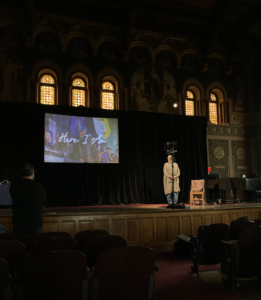Co-founders of the Satanic Temple Lucien Greaves and Malcolm Jerry spoke about their mission and activism on Oct. 16 in the HFSC Idol Social Room. The event was met with controversy, but was intended to bring a diverse group of voices to campus and spark conversation, according to Georgetown University Lecture Fund organizers.
The event was criticized by members of Georgetown’s Catholic community and Catholic Ministry because of the Satanic Temple’s “anti-Catholic actions and speech.” In response, Catholic Ministry hosted a prayer service in Dahlgren Chapel at the time of the event.
The moderator, Jewish Civilization Professor Jacques Berlinerblau, made opening remarks introducing the founders and the work they’ve done in the past, such as challenging laws that ban abortion or promote prayer in public schools. Afterwards, Greaves began by addressing some common misunderstandings about the group, sharing that people often doubt the Satanic Temple’s religious authenticity or regard them as an anti-Catholic hate group.
The Satanic Temple is a non-theistic religion that believes in “reason, empathy, the pursuit of knowledge,” according to their website. Greaves said that other religious groups sometimes view the Satanic Temple as a legalistic group aiming to “dismantle religious practices,” because of actions such as challenging religious monuments in state capitols; however, they also view themselves as a religion.
The Satanic Temple was formed specifically in response to the increasing role of religion in the U.S. government beginning with the election of former President Jimmy Carter, an Evangelical Christian who was the first president to invite the Pope to the White House, according to Jerry. He founded the Satanic Temple in the 2010s and chose to use Satan as their symbol as a rebellion against government involvement in religion.
“We do not believe in or worship Satan, we explicitly state that the name comes from sympathetic representations of Satan from romantic writers like Byron, Shelley, and Milton,” Jerry said.
Jerry cited two of former President George W. Bush’s executive orders issued in 2001 that allowed for increased interaction between religion and government. The orders established the White House Office of Faith Based and Community Initiatives, as well as centers to implement initiatives that gave religious organizations federal funds to provide Americans with services such as counseling services and soup kitchens.
“These executive orders, by their nature, circumvented Congress and created a new layer of federal bureaucracy that enabled religious organizations to compete for federal grants. The consequence has been that the government now spends unprecedented sums of money on religious social service programs,” Jerry said.
In response, Jerry, who was a student at Harvard University, conceived of a “poison pill” to challenge the notion that religious organizations should be allowed to receive government funding despite the separation between church and state.
“If religious organizations are free to apply for grants, a satanic entity should be able to receive funding for a worthy project,” Jerry said.
In 2012, during a renewed push for prayer in schools, Jerry recruited Greaves, who was also a student at Harvard, to organize a rally at the steps of the Florida capital. They praised then-governor Rick Scott for promoting school prayer, as it allowed students to “openly and enthusiastically pray to Satan at school assemblies.”
Since then, the Satanic Temple has been involved in various legal disputes challenging the privileges afforded to religious institutions, such as religious clubs in public schools, by demanding the same rights and representation for their organization and followers. They have also challenged laws, such as anti-abortion laws, that they claim violate their religion’s right to bodily autonomy.
Greaves and Jerry view the Temple as accommodationist, rather than separatist, as they aim to gain representation of the Satanic Temple alongside other religious organizations rather than call for a complete separation of church and state.
In response to the Lecture Fund’s announcement of the event, the Catholic Ministry released a statement expressing their disapproval and organized a “Prayer Service for Healing and Unity” at the same time as the event. Students also circulated a letter criticizing the decision to invite the founders and citing examples of the Satanic Temple’s offensive actions towards Catholics in the past.
The letter, titled “An Open Letter of Discontent Towards a Religious Hate Group on Campus,” was cowritten by the Catholic Women of Georgetown and GU Knights of Columbus and signed by 108 Georgetown students, as well as various student organizations, professors, and alumni.
“They are not a group that merely expresses opinions criticizing religion, but that they engage in and tolerate actions that deliberately show hatred and insensitivity towards religions,” Julian Jimenez (CAS ’24), who attended both the prayer service and the speaker event, said.
Students asked questions following the moderated discussion about whether certain actions done by the Satanic Temple violate the Temple’s own tenets and constitute hate speech. They questioned whether the founders considered actions such as attempting to erect a statue of the deity Baphomet in state capitols to be causing pain to Catholics. They then asked whether that pain violated their first tenet of striving to act with compassion and empathy.
“That’s self-created suffering. That’s something that you need to get over. There’s legitimate suffering that’s actually physically caused and there’s psychological torment that one manifests for one’s self,” Jerry said.
Greaves and Jerry defended acts such as creating an online abortion clinic called “Samuel Alito’s Mom’s Satanic Abortion Clinic,” saying they were a means of showing how they still had power to use their voice to stand up to others after Roe v. Wade was overturned.
“It’s about openly insulting [Alito] and showing people that we can still do that. We can still speak out, we can still issue a verbal slap to the face, even if we feel that we’re down for now,” Greaves said about the Supreme Court Justice who voted to overturn Roe v. Wade.
Greaves and Jerry noted that those actions ultimately were not encouraged by Temple leadership but instead done by individual members. They said other blasphemous actions, such as creating a statue of an inverted Jesus into whose spear wounds visitors could insert dollar bills, were done by people so they could feel a cathartic sense of personal independence from Catholicism–as many people who did these acts had unpleasant experiences with Catholicism–not to intentionally offend Catholics.
In one question Professor Berlinerblau asked about the validity of an observation that the Satanic Temple’s membership is primarily white, heterosexual, cisgender men. Greaves responded that it was incorrect and the Satanic Temple’s adherents were primarily women—with the majority of the leadership being women—as well as members of the LGBTQ+ community. He believed that people from these groups gravitated toward the Satanic Temple because of the patriarchal nature of religion, and because they felt that their identities were rejected by traditional religious organizations.
Jerry also noted that their membership is not restricted to people who are not a part of any traditional religious groups either.
“We see ourselves more like the Buddhists, where you can maintain whatever set of beliefs—and people do—whatever set of beliefs that they have and be a part of the Satanic Temple,” Jerry said.
Despite pushback, other students attending the speaker event found it informative.
“I really do think that if all of those people who are praying in Dahlgren were here, they would find it insightful, especially because we had people who were Catholic who were here who found it insightful in the same way,” Jackson Zambarano (SFS’26) said.
Professor Berlinerblau closed out the event by expressing gratitude for how the event was able to happen at a liberal Catholic university like Georgetown. He noted that if such an event had been proposed at universities such as the University of Notre Dame or Catholic University, it likely would not have occurred.





